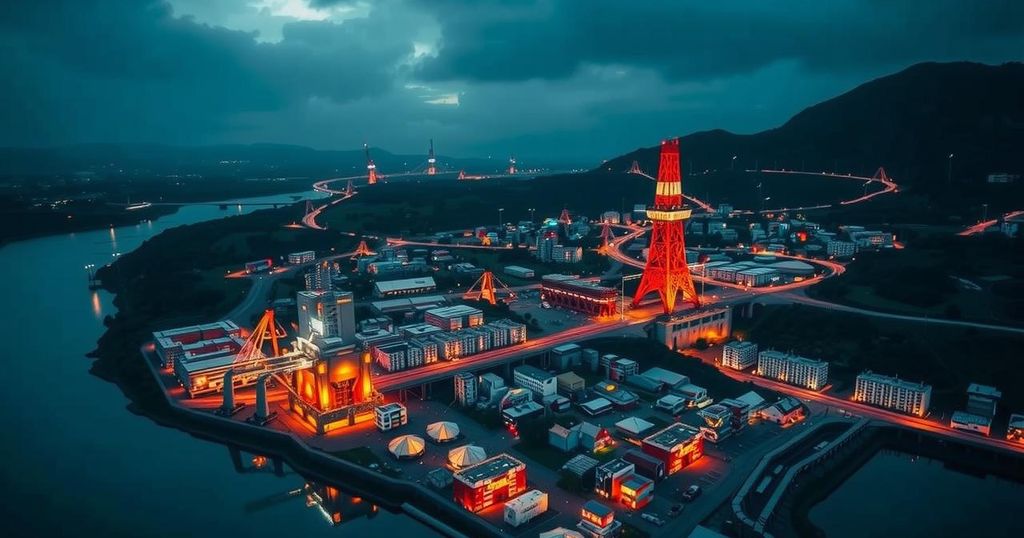Kolwezi, DRC, is pivotal in U.S.-Chinese competition over copper and cobalt. The U.S. has initiated the Lobito Corridor, a railway project to link Congolese mines to Angola’s Atlantic port, aiming to reduce Chinese dominance in critical minerals. President Biden’s visit emphasizes U.S. efforts to secure mineral resources; however, local communities remain largely untouched by these geopolitical maneuvers, grappling with poverty and corruption.
Kolwezi, a small city in the southern Democratic Republic of Congo (DRC), is vital globally due to its vast copper and cobalt resources. The city is now at the forefront of U.S.-Chinese competition for these critical minerals. Recently, U.S.-backed mining firms have initiated ore shipments via a newly established railway leading to Angola’s Lobito port, aimed at providing a counterbalance to China’s dominance in the region. President Biden’s visit to Lobito underscores the importance of this infrastructure project, intended to strengthen U.S. ties with Central African nations while mobilizing substantial financial backing from the U.S. government, the European Union, the G7, and private investors.
The Lobito Atlantic Railway, extending over 800 miles, significantly reduces transit times from Congo, positioning Lobito as a more effective shipping point to the Atlantic than India’s ports. However, despite this strategic initiative, China’s grip on DRC’s minerals remains firm, with Chinese companies controlling over 80 percent of the country’s copper mines and effectively monopolizing cobalt extraction. This situation is compounded by China’s extensive investments in Africa through initiatives like the Belt and Road, often leading to a head start over American efforts in the region.
In Kolwezi, the visible presence of Chinese businesses reflects the region’s reliance on Chinese miners and traders, prompting concerns from local experts regarding the efficacy of the Lobito corridor in disrupting established Chinese operations. Some analysts suggest that the U.S. initiative may be more symbolic than transformative, as it lacks substantial on-ground American investment and infrastructure, causing doubts about its long-term impact.
Local communities in Kolwezi, however, remain largely unaffected by these geopolitical maneuvers, enduring poverty and corruption while scraping a living through artisanal mining. The DRC ranks low on the global Corruption Perceptions Index, highlighting persistent governance challenges that hinder local population benefits from the country’s mineral wealth. As individuals like Marie Banza Ngoy, who labor tirelessly for minimal compensation, reveal, the promise of national wealth often bypasses the very people who mine these valuable resources, which are frequently sold to intermediary traders before reaching Chinese investors.
As the competition for critical minerals intensifies, the question remains whether U.S. efforts through initiatives like the Lobito Corridor will translate into meaningful change for local communities in Kolwezi and beyond.
Kolwezi is known for its significant deposits of copper and cobalt, essential components in various industries, particularly in electric vehicle manufacturing. Given the geopolitical context, the U.S. has increased its focus on securing critical mineral sources in Africa, a region where China has established a predominant stronghold following years of investment. The Lobito Corridor project represents a broader strategy to encourage American and allied investments while stamping out Chinese influence in Central Africa.
In conclusion, Kolwezi’s critical mineral wealth positions it at the center of U.S.-Chinese rivalry in Africa. While the U.S. seeks to enhance its influence through initiatives like the Lobito Corridor, China’s existing dominance in the region remains formidable. The local population continues to endure economic hardships, indicating that geopolitical strategies must not only focus on resource control but also on improving the livelihoods of those within the mineral-rich areas. Without addressing structural issues of poverty and corruption, efforts to reshape the balance of power may ultimately prove futile.
Original Source: www.wmra.org






